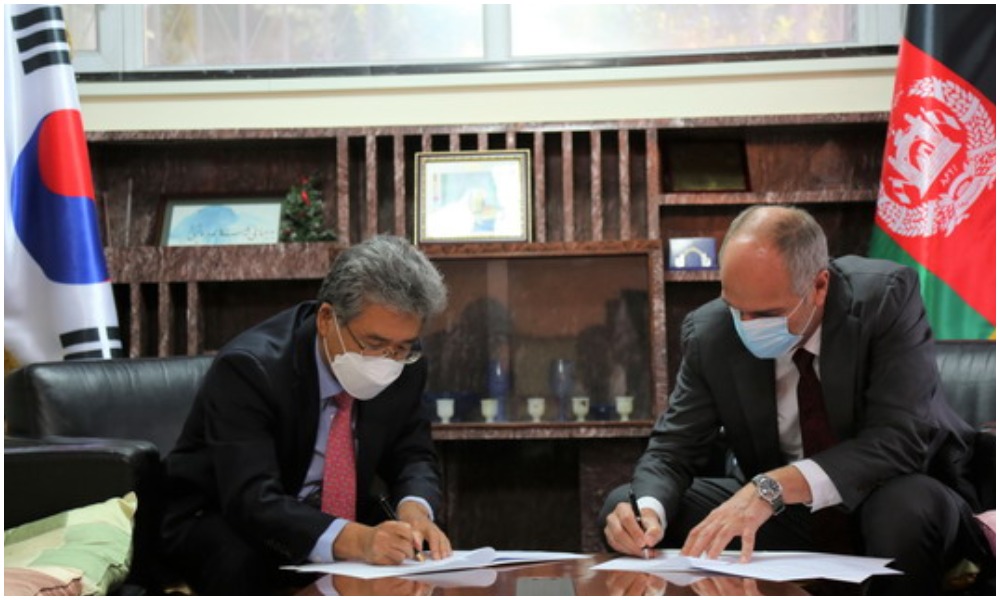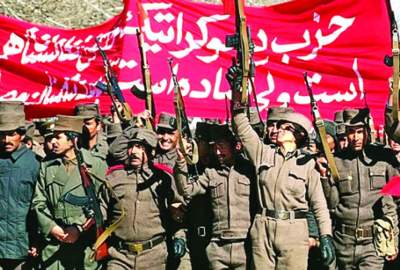The Korean embassy in Kabul signed a US$1 million grant with the World Health Organization (WHO) this week to assist in efforts to fight the COVID-19 pandemic in Afghanistan.
Publish dateWednesday 16 September 2020 - 11:31
Story Code : 218977
According to WHO, the organization will receive funding to implement the “Strengthening access to quality health care in the most vulnerable population in Afghanistan” project, over a six-month period.
In a joint statement issued by the organizations, WHO said the project is expected to bolster efforts to increase COVID-19 testing across the country through the provision of specimen collection kits for 15 rapid response teams (RRTs), which will enable sample collection from 40,500 people; provision of diagnostic kits to the Ministry of Public Health to cover testing for 50,000 people, and provision of testing consumables for RRTs and laboratory technicians across the country to cover testing needs for at least 10,520 people.
“The project will also play a critical role in improving awareness about COVID-19 through community-based engagement, targeting 314,900 people across priority regions of the country and building field teams’ capacity to better engage and communicate with communities.” the statement read.
The grant arrangement was signed by the Korean ambassador Zha Hyoung Rhee, and Dr Richard Peeperkorn, WHO Representative for Afghanistan.
Both parties to the agreement emphasized the importance of continued support from the international community to help Afghanistan in its fight against COVID-19.
“While the pandemic does not respect borders when it comes to its negative impacts, there is no denying that those countries which lack in medical infrastructure are more vulnerable,” said Rhee.
“Considering Korea’s experiences, 3Ts, i.e., testing, tracking, and treatment constitute the major components of an effective response to the pandemic. I sincerely hope that the support from Korea, especially regarding the earliest stage of those response activities, will help mitigate, to a considerable extent, the impact of the pandemic which has been inflicting enormous damage not only on the already dire humanitarian situation but also on the essential socio-economic fabric of Afghanistan,” Rhee added.
More than six months since the onset of the COVID-19 emergency in Afghanistan, cases continue to rise but severe testing restrictions have plagued the country, which already has a fragile health care system.
As of Monday, 38,772 confirmed cases and 1,425 deaths had been reported.
Peeperkorn in turn said: “The crisis is far from over.”
He noted the country had gone through a substantial first wave but that everyone needs to be prepared for secondary spikes.
While Afghanistan’s official COVID-19 toll stands at close to 40,000, the Afghan Health Ministry and WHO stated early last month that they estimate nearly a third of the population – about 10 million people – had already been infected.
Health Minister Ahmad Jawad Osmani told reporters on August 5 that a survey had been carried out and had been based on antibody tests.
The survey estimated that about 31.5 percent of the population of 32 million had contracted the virus, with the highest infection rate in the capital, Kabul where more than half of the city’s five million people are believed to have been infected.
Afghanistan, which has poor health infrastructure and has been wracked by decades of war, has only limited testing capacity.
But the new “Strengthening access to quality health care in the most vulnerable population in Afghanistan” project is a part of the COVID-19 ONE UN Health Response Plan and is aligned with the overall support that WHO is providing to Afghanistan to address needs related to COVID-19.
In a joint statement issued by the organizations, WHO said the project is expected to bolster efforts to increase COVID-19 testing across the country through the provision of specimen collection kits for 15 rapid response teams (RRTs), which will enable sample collection from 40,500 people; provision of diagnostic kits to the Ministry of Public Health to cover testing for 50,000 people, and provision of testing consumables for RRTs and laboratory technicians across the country to cover testing needs for at least 10,520 people.
“The project will also play a critical role in improving awareness about COVID-19 through community-based engagement, targeting 314,900 people across priority regions of the country and building field teams’ capacity to better engage and communicate with communities.” the statement read.
The grant arrangement was signed by the Korean ambassador Zha Hyoung Rhee, and Dr Richard Peeperkorn, WHO Representative for Afghanistan.
Both parties to the agreement emphasized the importance of continued support from the international community to help Afghanistan in its fight against COVID-19.
“While the pandemic does not respect borders when it comes to its negative impacts, there is no denying that those countries which lack in medical infrastructure are more vulnerable,” said Rhee.
“Considering Korea’s experiences, 3Ts, i.e., testing, tracking, and treatment constitute the major components of an effective response to the pandemic. I sincerely hope that the support from Korea, especially regarding the earliest stage of those response activities, will help mitigate, to a considerable extent, the impact of the pandemic which has been inflicting enormous damage not only on the already dire humanitarian situation but also on the essential socio-economic fabric of Afghanistan,” Rhee added.
More than six months since the onset of the COVID-19 emergency in Afghanistan, cases continue to rise but severe testing restrictions have plagued the country, which already has a fragile health care system.
As of Monday, 38,772 confirmed cases and 1,425 deaths had been reported.
Peeperkorn in turn said: “The crisis is far from over.”
He noted the country had gone through a substantial first wave but that everyone needs to be prepared for secondary spikes.
While Afghanistan’s official COVID-19 toll stands at close to 40,000, the Afghan Health Ministry and WHO stated early last month that they estimate nearly a third of the population – about 10 million people – had already been infected.
Health Minister Ahmad Jawad Osmani told reporters on August 5 that a survey had been carried out and had been based on antibody tests.
The survey estimated that about 31.5 percent of the population of 32 million had contracted the virus, with the highest infection rate in the capital, Kabul where more than half of the city’s five million people are believed to have been infected.
Afghanistan, which has poor health infrastructure and has been wracked by decades of war, has only limited testing capacity.
But the new “Strengthening access to quality health care in the most vulnerable population in Afghanistan” project is a part of the COVID-19 ONE UN Health Response Plan and is aligned with the overall support that WHO is providing to Afghanistan to address needs related to COVID-19.
Source : Afghan Voice Agency(AVA)
avapress.com/vdcd5j0x5yt0fn6.em2y.html
Tags
Top hits







